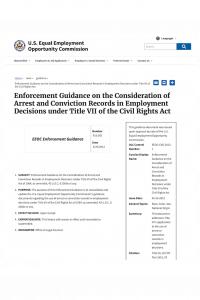Enforcement Guidance on the Consideration of Arrest and Conviction Records in Employment Decisions under Title VII of the Civil Rights Act
U.S. Equal Employment Opportunity Commission
The U.S. Equal Employment Opportunity Commission (EEOC) enforces Title VII of the Civil Rights Act of 1964 (Title VII) which prohibits employment discrimination based on race, color, religion, sex, or national origin. This Enforcement Guidance was issued as part of the Commission's efforts to eliminate unlawful discrimination in employment screening, for hiring or retention, by entities covered by Title VII, including private employers as well as federal, state, and local governments.
The Commission has well-established guidance applying Title VII principles to employers' use of criminal records to screen for employment. This Enforcement Guidance builds on longstanding court decisions and policy documents that were issued nearly 30 years ago. In light of employers' increased access to criminal history information, case law analyzing Title VII requirements for criminal record exclusions, and other developments, the Commission decided to update and consolidate in this document all of its prior policy statements about Title VII and the use of criminal records in employment decisions. Thus, this Enforcement Guidance supersedes the Commission's previous policy statements on this issue.
The Commission intends this document for use by employers considering the use of criminal records in their selection and retention processes; by individuals who suspect that they have been denied jobs or promotions, or have been discharged because of their criminal records; and by EEOC staff who are investigating discrimination charges involving the use of criminal records in employment decisions.
